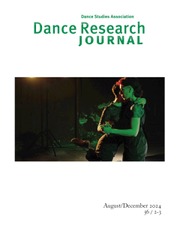Article contents
Methods and Procedures: Research Perspectives in Dance
Published online by Cambridge University Press: 14 May 2024
Extract
The employment of the scientific process to gain additional insight into a particular problem beyond the ordinary inquiry of the problem is commonly referred to as research. In fact, the term research can be substituted for scientific process. In general, research differs from other scholarly activities in regard to the methods and procedures under which the problem is studied and analyzed. Research further aims to enlarge the fields of knowlege already in existence. The researcher identifies a problem or an issue within his/her field of interest and then systematically undertakes to answer specific questions or hypotheses concerning the problem.
The scientific problem under consideration by the researcher must be a significant, well-defined problem as well as one that the researcher is totally involved in answering. This is a most important aspect of the research process because the identification and the statement of the problem directs all of the later activities of the inquiry. The statement of the problem is a roadmap of the territory under consideration.
Once the statement of the problem has been identified in clear, percise terms the researcher moves into the second phase of the research process, namely the proposal of the hypothesis or hypotheses. An hypothesis is a guess that the researcher makes about the problem and it provides a basis for the research, therefore it is a vital aspect of the entire study regardless of the type of research being undertaken. A hypothesis is generally a statement of expected relationships among the variables. Whether the hypothesis is accepted or rejected should not be the prime objective of the researcher. Statistically significant results are not necessary to add knowledge to our existing knowledge; statistically insignificant results also add to our knowledge. The hypothesis may be viewed as an “if … then …” type of relationship. If certain conditions prevail, then certain other things will result.
- Type
- Articles and Reports
- Information
- Copyright
- Copyright © Committee on Research in Dance 1973
Footnotes
Presented at the CORD Meetings, June 14, 1973, Duke University
References
SELECTED REFERENCES
- 2
- Cited by


